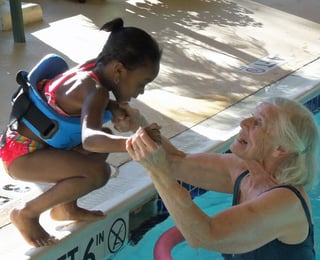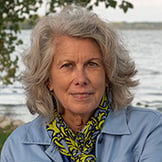Published: February 13, 2018
 One of the cornerstones of Kendal at Oberlin is a rich intergenerational atmosphere that provides residents with lots of opportunities to engage with younger generations.
One of the cornerstones of Kendal at Oberlin is a rich intergenerational atmosphere that provides residents with lots of opportunities to engage with younger generations.
Residents volunteer at the Early Learning Center, an early childhood program located on Kendal’s campus, and they mentor Oberlin College students. Friendships are forged with area high school students who work in the dining room.
These are just a few examples of why Kendal has garnered accolades for its intergenerational focus. In 2012, the city of Oberlin was recognized as one of the nation’s top intergenerational communities by Generations United (GU) and the MetLife Foundation. In 2013, Kendal at Oberlin accepted a Shared Site award from GU for its exemplary programs that bring older adults together with young people and children and was recertified in 2017 as a “Program of Distinction” for another 3-year period.
An Interview with Senior Living Expert Brad Breeding - Intergenerational Benefits
Why are intergenerational relationships important, and what are life plan communities like Kendal doing to promote them? For insight, we asked senior living expert Brad Breeding, co-founder and managing partner of myLifeSite™.
Q. You wrote in a recent blog that intergenerational programming is a hot topic. Why?
A. Studies very clearly show that there are huge benefits to participants in intergenerational programs—benefits to both the older adults and the youth. Older adults who participate in these programs are less likely to experience falls, are in better shape physically and perform better on memory tests. But the studies also show that youth who are involved in these programs are less likely to begin using drugs and alcohol and skipping school. So there is a clear win-win. I think in our world of social media and artificial online “friendships,” the bond that takes place in these programs has real depth and meaning. There is a real connection taking place that impacts both parties.
Q. Can you tell us about some of the exciting intergenerational programs going on at Continuing Care Retirement Communities (CCRCs)?
A. I’ve seen several really great ones recently. Just the other day, I learned about one in North Carolina whereby a nonprofit that provides afterschool and summer programs for refugee and immigrant children actually began operating on the campus of a continuing care retirement community. The residents are very active participants in the program, particularly those who have a background in early childhood education.
There have been several others recently where college students are able to live rent-free in a retirement community, and the benefits have been enormous. I could go on and on. Of course, Kendal’s Early Learning Center is an excellent example.
Q. Can intergenerational programming help “recruit” younger residents and add to the financial health of the retirement community?
A. I think prospective residents want to maintain a connection to the broader community and continue to feel like they’re making a difference in the world. Of course, as I mentioned before, it’s also very healthy. It speaks to the vibrancy of a community and counters the perception that a retirement community is a place where old people go to sit around all day long. The next generation of retirees wants to continue impacting the world, and this is one way to do it if it’s done right and has real depth.
Q. Describe some of the benefits you’ve seen for CCRC residents located in a college community.
A. I think there are a variety of benefits that come with being located in a college town. This isn’t to say that a community cannot be successful otherwise, but there are some additional benefits in terms of opportunities for intergenerational programs, and otherwise. I mentioned the example above of college students even residing in retirement communities. But think of all the other opportunities for collaboration with students for projects, essays, etc. It just takes a little bit of creative thinking.
Q. Looking to the future, do you think intergenerational programming will continue to grow at CCRCs? Does research show that this appeals to baby boomers?
A. I believe so. It seems pretty obvious to me. Of course, there are other things that a prospective resident will look for, so intergenerational programs, by themselves, may not necessarily be a huge driver. But combined with other things such as flexible dining programs, strong financial management, and residents having a voice, I think you’ll find that intergenerational programs will be a valuable addition.
Discover Intergenerational Programs at Kendal at Oberlin
Kendal at Oberlin creates an opportunity for intergenerational activities every day. There is so much that can be learned from friendships that span generations. To learn more about Kendal at Oberlin and the intergenerational programs we offer, explore our website, read our blog, sign up for our weekly email or contact us for more information.

In the past, Molly Kavanaugh frequently wrote about Kendal at Oberlin for the Cleveland Plain Dealer, where she was a reporter for 16 years. Now we are happy to have her writing for the Kendal at Oberlin Community.
About Kendal at Oberlin: Kendal is a nonprofit life plan community serving older adults in northeast Ohio. Located about one mile from Oberlin College and Conservatory, and about a 40-minute drive from downtown Cleveland, Kendal offers a vibrant resident-led lifestyle with access to music, art and lifelong learning.





